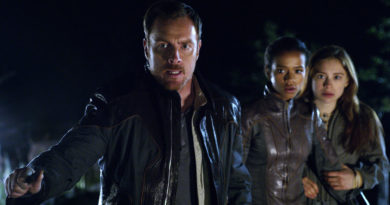Lost in Space Season 1 Review (Spoiler-Free)
This is a spoiler-free review
There are almost too many truly great shows on television. At any given moment in the calendar year, there are at least five TV series running that are transcendently great. Right now, Atlanta, Black-ish, The Americans, Silicon Valley, Barry, and many more are all competing for your attention, along with seemingly infinite other classic options available to stream.
The experience for a dedicated TV-watcher looking for only the best content can be overwhelming. It’s like truffle hunting if truffles grew in fields of other truffles and you were determined to find only the most perfect ones. No one wants to miss out on the next Breaking Bad or The Wire. Sometimes this hunt for greatness can become stressful enough that one longs for a well-done, inoffensive show that strives to be merely above average and succeeds in doing so.
Netflix’s Lost in Space may in fact be one of those shows. Lost in Space, adapted from the at-times corny 1960s TV series and ill-fated 1998 film, is proudly above average.
The show, which is run by Zack Estrin (Prison Break) and written by Matt Sazama and Burk Sharpless (Dracula Untold), takes what has always been a fascinating, slam-dunk concept (what if Robinson Crusoe was in outer space and less racist?) and produces a final version that’s exactly as above average as it should be. Lost in Space doesn’t transcend its fun science fiction concept, nor does it completely blow it.
Like the show and movie before it, Lost in Space tells the story of the Robinson family: father and soldier John Robinson (Black Sails’ Toby Stephens), mother and brilliant aerospace engineer Maureen Robinson (the criminally underrated Molly Parker), daughters Judy (Taylor Russel) and Penny (Mina Sundwall), and youngest son Will (Maxwell Jenkins).
In the Robinson’s version of Earth, 30 years from now, the planet is in turmoil. Various wars and political conflicts have kept John away from his family for months at a time, and the sky is rarely, if ever, blue. Humanity has begun to colonize a new planet called Alpha Centauri. The Robinsons decide to leave as a family to start again on a new world. Their mission goes haywire, however, and their spaceship, the Jupiter 2, crash lands on an unknown planet where they will have to problem-solve their way back to safety.
Lost in Space has two huge things going in its favor. For starters, the production design is superb. Netflix has been spending money like a drunk at closing time for years now and Lost in Space is one of the first series where the money really appears onscreen. Everything from the costumes to the sets is so clearly lovingly and carefully crafted. The show’s technology feels appropriately near-future-y.
The other area where the show excels is its deep appreciation for problem-solving. Lost in Space is nowhere near Better Call Saul in terms of thematic brilliance but it does have plenty of Vince Gilligan’s narrative penchant for “introduce problem, then solve problem.”
The show’s first episode (of 10, five of which were made available to review) is the season’s best in no small part because within the first ten minutes, the Robinson’s are confronted with no fewer than three major crises they must confront to survive. Other episodes of the series don’t so much have a plot as they do a central existentially threatening problem that the characters must band together to solve.
The end effect of all this creates a show that is agreeably-paced and whose faults are easy to overlook. While those faults are easy to overlook, they are also difficult to completely ignore.
The Robinson family mostly work as characters as the writers have already existing blueprints to flesh out from the original series. The family works well together and each character is capable enough to contribute to the family’s survival. The problem, however, is that the characters themselves don’t always hold water on their own.
Toby Stephens gruff, overtly masculine appearance at times works against him as a believable loving father and husband to an aerospace engineer. The show is able to mitigate this somewhat by playing up his experience and identity as a solider. Then Don West (a character from the original series, this time played by Ignacio Serricchio) shows up and Lost in Space suddenly finds itself with two lead characters doing Han Solo cosplays in a show that’s otherwise populated by very serious and capable science-types.
Lost in Space also makes a very bold casting choice in selecting Parker Posey to embody another crucial character from the original series: Dr. Smith. The show takes for granted that Smith’s personality is supposed to be fluid and devious and drops the ball too many times on actually fleshing her out as a character.
Thankfully, the most important character does not disappoint. Yes, “Robot” is in this version, and yes, he’s great. The Lost in Space “franchise” has always implicitly understood something very important about storytelling and human beings in general. Robots are like cats. Sure, you could give them a cute name, if you want, but we’re all just gonna call them “Robot” or “cat” anyway.
The Robot is a very frequent and strong presence for the show. He represents an important overarching mythology for the show that always threatens to get bogged on in its own problem-solving prowess. He’s also just weirdly cute and endearing. Every time the show is able to wrestle some emotional pathos from its plot, the Robot is involved.
Ultimately, Lost in Space is a refreshing and important entry into an endangered kind of TV: above average escapist entertainment. It’s likely not destined for any year-end top ten lists…and I’m strangely grateful for that.


